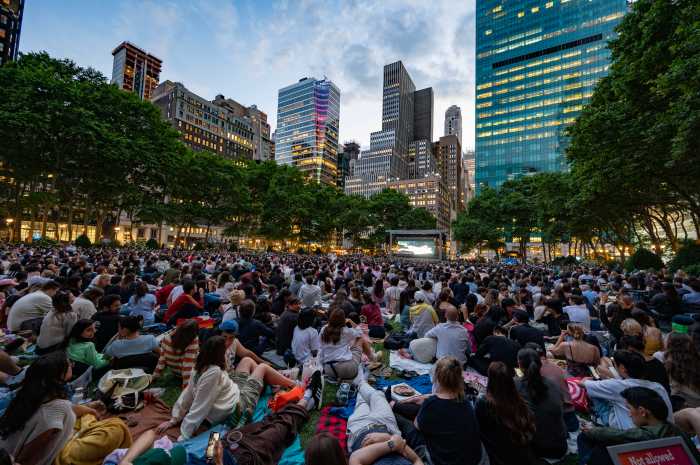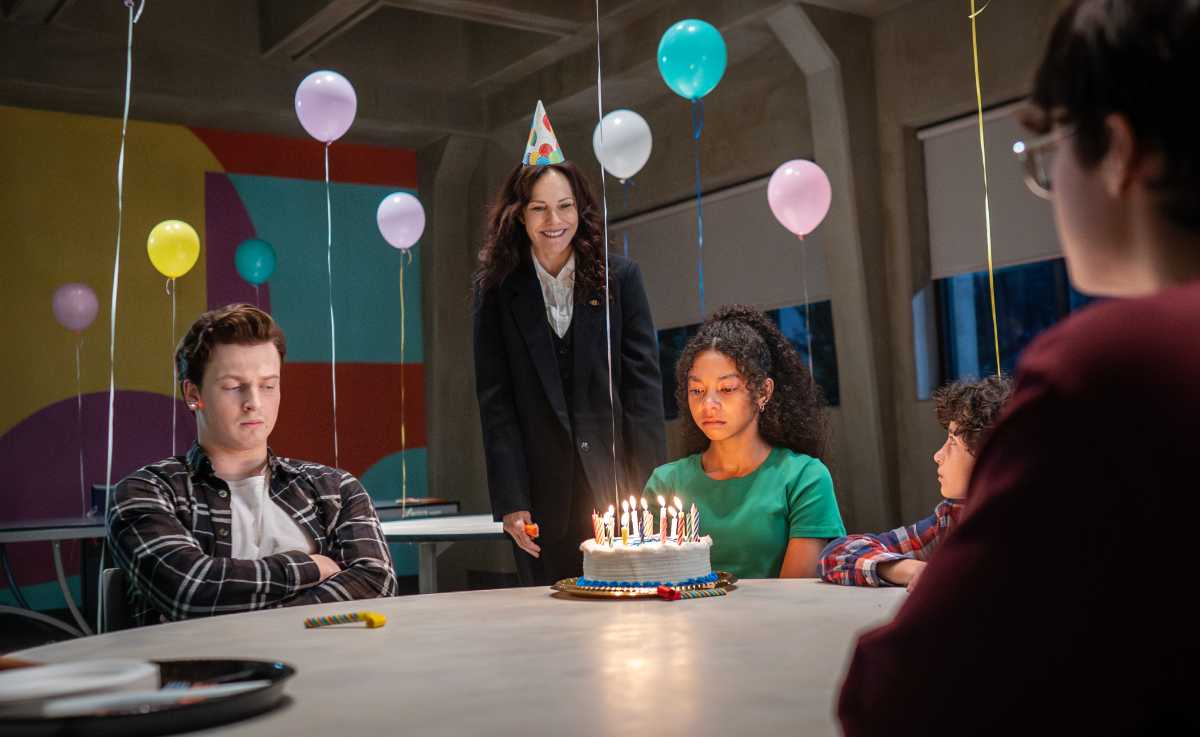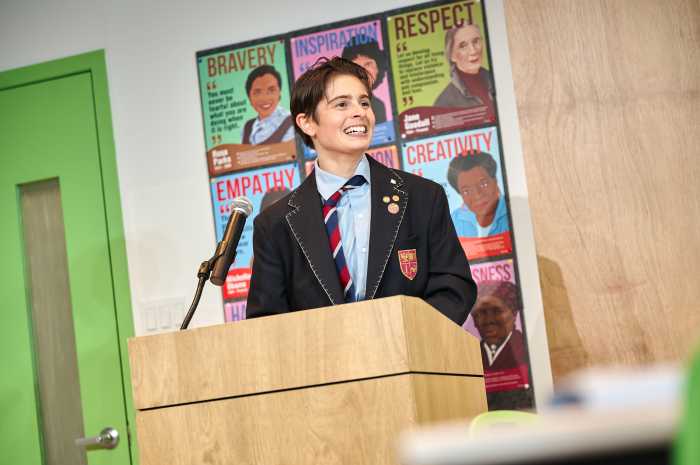It’s not often a first-time director gets to work with a screen legend like Arnold Schwarzenegger.
And it’s less often that the director gets to put that icon in booty shorts and a tankini.
“That was his first day on set,” says Taran Killam, director of “Killing Gunther.” “He plays a hit man who is at the center of a documentary being produced by a group of his (hypothetical) peers who want him dead, though they hilariously lack the skills to take him down.”
Killam, who also wrote the film, stars as Blake, an assassin who hires a film crew to chronicle the killing. The movie also features fellow “Saturday Night Live” alum Bobby Moynihan and “New Girl’s” Hannah Simone as his accomplices.
amNewYork spoke with Killam, 35, about the film, which opens Friday at City Cinemas Village East and on demand.
Arnold is a big part of this movie. What was the process of getting him attached to the film?
We made a video offer because we’d heard that he was looking to do . . . you know, he’s been doing indie films and kind of trying different things, unexpected things, things outside his comfort zone, and was looking to do a comedy. So when they said that he may be willing to consider it and read it, I shot this video offer and sent that along with the script. And about a week later, he Facetimed me and said he really liked the project and we talked about it. It was such a gift because it wasn’t something that I initially conceived of. He was pitched to me and I sort of scoffed at that because it didn’t seem possible. But, yeah, he was on board. He got it and was so game and so much fun to work with.
This is your directorial debut. Can you tell me about that experience and working with Arnold?
Yeah, I mean I certainly felt the pressure to not disappoint Arnold, not make him feel like his time was being wasted. But also not disappoint myself. And the decision to direct kind of came later in the process. I had written the script and wanted to act in it. But it just got to the point where nobody was going to live with it as much as I already had. And it felt like something I could tackle . . . because I saw it so clearly in my head. I had to take a shot and know if I could do it, if I could accomplish it. I’m proud to say it’s pretty darn close to what I initially envisioned, but better because it’s got Arnold Schwarzenegger in it.
What was that process like of learning this craft?
Yeah, it was remaining open to the expertise of the cast and crew around me. I’ve been working in the industry for a fairly long time now and have always made it a point to observe and watch the process and understand the different facets and elements that go into creating a film. But when I made the decision to direct, I sort of made it my M.O. to stay open. . . . I wanted to keep learning. The most important thing I knew is I didn’t want to presume I knew better than anybody there. I told a lot of the crew and department heads, like, “I’m trusting you. I’m kind of giving myself over to you. That you are the master of your expertise and I’m going to do my best to communicate to you what we’re trying to achieve and remain open to your input.” And that collaboration was incredibly rewarding.
You have tons of explosions and fight choreography. What was the learning curve on doing this kind of technical work?
Most important to me was safety, really. Being a first-time director, I was terrified that anything would and could go wrong. Because even with all the preparation in the world, that could still happen. We really emphasized safety in rehearsal and practice and open communication so that everybody knew what we were doing on set. And that just comes with the preparation. We prepared, and then over-prepared and then prepared a little bit more. So that by the time we’re actually executing these sequences or these fight sequences or the explosion sequence, we’re also having fun. You’re able to enjoy the moment more because you know you’re done the hard work.
So you have some not-typical action stars. How did they take to that more physical role?
It was always my intention to have comedians and have people who you wouldn’t normally expect to be cast in an action film. That was part of the humor for me. . . . It’s a heightened reality we’re living in. So it was so funny. It was basically finding a reason for me and my friends to run around and do a grown-up version of cops and robbers, you know?
Having directed this, did this kind of change you as an actor? Do you have a different perspective now?
Without a doubt. I love to act. I love to make movies. I love to make television, so I’m not necessarily one to complain. But now, having seen an entire film from conception to execution to distribution, I have a much, much greater appreciation for what it takes, for how much work and how many different people are involved. . . . Even on this film I’m doing now in Atlanta, on the set of “Night School,” I’m incredibly empathetic to everybody, to the scheduling, to time, to cost. So, yeah, if anything, it only gave me a greater appreciation for this process of moviemaking.
Was there any advice or moment you had with Arnold that stuck with you?
He’s been pretty incredible throughout the whole process. But it was really, really impressive to see him come alive as a businessman, talking about distribution and promos and, the way he said, “You want to create excitement and you want to create buzz and you want to get people talking about this movie. You want to create awareness.” And he told me that when the first “Conan” movie was coming out, he was talking to the marketing guy and they were saying, like, “Oh yeah. It’s going to be great. It’s going to do well.” And Arnold said he’d just walk up and down Fifth Avenue asking people if they knew the new “Conan” movie was coming out. He said after he did that the first time, people weren’t aware. Like, maybe one or two people out of every 10 he asked was aware. So he pounded the pavement. He’s like, “I knew I needed to take it upon myself to get the word out there and do press and do promotion wherever I could.” And it really just made me appreciate and respect him so much more that he enjoys the process, right? And he is constantly educating himself and informing himself of how to be better and how to make a better film, but also how to distribute it. He’s incredibly smart. And the experiences that he’s had are so vast and varied, it really was just an honor to work with him.
Are you going to go to Fifth Avenue?
I have to pound the pavement — exactly, I have to walk up and down the street now. Yelling at the top of my lungs, “‘Killing Gunter’” is coming out! ‘Killing Gunther’ is coming out!”
What else are you working on?
[I’m] shooting this movie called “Night School” with Kevin Hart and Tiffany Haddish. That comes out next September. Writing my next script now. And I just moved with my family [he’s married to actress Cobie Smulders] back to Los Angeles. So the next little chunk of time will just be about adjusting and setting up shop there.
What do you miss most about NYC?
The pizza!
That’s what everyone says!
No, no. The people. I meant the people, the friendships I’ve made. I think that’s probably true of any major transition or shift: You always miss the people.
I was going to ask if you’d return to Broadway after your short run in “Hamilton,” but I guess that makes it a lot harder.
I would love to. Yeah, yeah, exactly. Now it’s more of a challenge. But if the right project and the right role came along, I would absolutely jump at that chance.



































